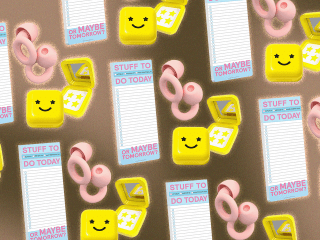8 Ways to Be There for Someone Who Lost Their Job
Hey, a little bed rotting never hurt anybody.
Your friend texts you with a not-great life update: “So, I just lost my job.” Of course you’re bummed and want to be there for them, but…how? A lot of people have been dealing with job loss lately due to rampant layoffs in pretty much all fields, so you’re not alone if you’re looking for the best ways to help (or at least not harm) the situation.
As a social worker and therapist, I’ve seen how hard these unexpected transitions can be. But that didn’t make it sting any less when I recently found myself in the same position as many of my clients over the years—dealing with a “severed” relationship with my former employer. The experience left me reeling and filled with questions: What would happen to my clients? How would I make rent next month? How do I apply for health insurance? Do I have to sign that thing they sent me? I also felt very alone—until I was reminded by my support system that they had my back. I had colleagues to help me network, family to share my outrage, and friends at the ready to distract and motivate as needed.
I’ve worked with therapy clients from various fields through job loss, and each person has needed a different approach. Some people want emotional support and a space to vent, while others want to make a five-point plan and figure out what comes next as soon as possible. Most will benefit from a combination of the two. What I’ve learned from now being on both sides of this dynamic is that the best way to truly help someone is by showing up and asking. If it still feels a little intimidating to approach the subject of someone else’s job loss, here are a few suggestions.
1. Ask what they need before assuming you know best.
The best way to know what will help someone heal from an ego-damaging loss like this is to simply ask: “How can I help?” Do they need some time alone to process the loss? Do they want to be around loved ones to help boost them up? Do they need help finding a therapist to process what just happened? We can only be helpful when we know what will actually help! So don’t shy away from asking how you can best support the people you care about.
Losing your job can be a very vulnerable experience, and feeling heard, understood, and connected becomes even more important than usual. So, if your friend says they aren’t ready to talk about it yet and they need some time to process on their own, give them some space. If your spouse wants to go into detail about being fired, let them vent. If your sibling wants to start applying to jobs yesterday, send along those job listings that fit the bill for them. Respecting how your loved one chooses to grieve the loss of a job shows that you really want to help.
2. Remind them their feelings are valid.
You get hit with a lot of empty platitudes when you lose a job (think: “It wasn’t meant to be!”). And while these kind words can sometimes be helpful, they can also feel dismissive if that’s not where you’re at emotionally. Every job loss is different, and there are so many factors that can contribute to how someone reacts to it.
If they were fired, they might be feeling angry with a side of bruised ego, whereas if it was a mass layoff, they’re probably feeling confused and sad. If this was their dream job, they might be taking a hit to their self-esteem and feeling unsure of what they would even want to do next. Maybe this was a job they kinda hated or a field they accidentally stumbled into, in which case they might be feeling relieved and motivated to make a change.
With any of these reactions, you can validate their feelings and remind them that whatever comes next will likely be better due to the lessons they’ve inevitably learned from this experience. Just be careful not to rely on clichés, which can feel disingenuous.
3. Keep checking in.
In the days/weeks/months following a job loss, this person is probably going to feel a range of emotions: sadness, fear, anxiety, and maybe even relief for some. When the crisis of it all fades and they have a chance to regroup, they may not need as many hugs and tissues as they do job listings, motivational quotes, and help with budgeting.
So make it a point to check in regularly—even after the immediate aftermath. If you’re not sure what to say, ask questions that are relevant to what they’re sharing with you. For example, if someone keeps venting about their total lack of routine these days, you can check in with, “How’s your motivation doing today?” Or, if they just told you about their 27th job application that went nowhere, you can ask if they want another set of eyes on their resume or searching through job boards.
4. But remember to maintain healthy boundaries too.
When someone we love is struggling it can be easy to overinvest in their wellbeing and neglect our own. But it’s completely possible and necessary to maintain healthy boundaries while providing support to others. I know—easier said than done. Personally, I have the quote, “Kindness without boundaries is self-sabotage,” framed on my wall to remind me that I need to take care of myself first before taking care of others.
If you find your boundaries being pushed by a loved one who is out of work, it’s OK to set some gentle limits. A good question to ask when someone is complaining about the same thing over and over again is, “Do you need to vent or would you like advice?” If they say they just need to vent (and they’ve already been doing that for the last several days), it’s perfectly acceptable to add some boundaries here. You might say, “OK, I can give you 5 minutes to vent about this now, then we can [insert fun/distracting/productive activity or discussion topic here].” You can also try something like, “I want to make sure I’m supporting you, but I also have some things I want to share too.” This reminds them that you’re here for them (within reason) and that the support doesn’t just go in one direction.
5. Let them rest!
When I lost my job, I had my fair share of days where I chose bed rotting over differently productive activities, and it was so very needed for me to fully recognize how burned out I was and to grieve the loss. Many people out of work don’t realize how much they really need rest until they are no longer faced with the daily pressures of a high-needs job. So it’s important to allow time for recovery before jumping back into the process of applying, interviewing, and starting a new job.
Of course, some people can only afford to take a day before getting back to business while others can go at a more leisurely pace. Either way, validating your loved one’s need to rest and recover can help alleviate any feelings of shame and guilt, which will ultimately make it easier for them to move forward when they are ready.
6. But don’t be afraid to give them a reality check when needed.
Everyone needs to take a breather after getting let go. But if that breather seems to be extending into a break that you know isn’t financially or emotionally smart for someone, it might be time to speak up—especially if this impacts your relationship in a big way (think: a romantic partner or close friend and roommate).
For instance, if your partner was just let go, it’s justifiable to talk about what this means for your shared resources or responsibilities. Try using “I” statements when expressing your feelings related to their job loss. That might look like, “I’m feeling frustrated and concerned because I don’t know how to support you right now,” or “I feel overwhelmed being the primary source of income for our family, and I think it would help if we could make a plan together about how to adjust going forward until you find your next role.” Stay away from blaming or shaming language so that your loved one doesn’t feel attacked and is more open to hearing what you have to say.
7. Remind them who TF they are.
It’s common for anyone’s ego to feel tender and bruised after a job loss. This will likely be a time when their internal validation might waver, and they will need to rely on external validation from their support systems to get back on track. Telling your friend how skilled they are at making connections with people, reminding your partner how they’ve adjusted to other roadblocks in the past, or even just texting a sibling a funny meme about being a BAMF will let them know you are on their side and rooting for them.
When I found myself suddenly unemployed and it was time to tell my friends and family what happened, I felt self-conscious. I worried they might judge me for the company’s decision and it would change how they saw me in our relationships. Those fears were quickly extinguished when my support system and professional network shared my outrage and provided me with all the various forms of support I needed, when I needed them, for which I am very grateful.
8. Encourage them to get help—especially if you’re worried about them.
Job loss can be a huge blow to someone’s mental health, and it’s not uncommon for this experience to trigger or exacerbate things like anxiety, depression, or substance use issues. Expressing concern for someone you love who is clearly struggling can be intimidating, but it can also be life-saving.
And, when I say “clearly struggling,” I don’t mean having a few low days or taking their time applying to jobs. Signs of distress that are cause for concern can vary from person-to-person but, in general, if there is a noticeable and persistent change in the person’s hygiene, appearance, demeanor, or mood, those could be signs that there is a bigger problem to address.
Let’s say your super social and upbeat friend is suddenly canceling plans a lot and doesn’t seem to have much energy when you do see them. Check in with them one-on-one and tell them you’ve noticed a shift. Or if your sibling who’s usually dressed to the nines shows up to an event looking unkempt, gently ask how they are doing without expressing judgment about how they look.
This is also a good time to point them towards resources like therapy directories or crisis hotlines, like 988. A lot of people worry that asking someone if they’re having suicidal thoughts will plant the idea in their heads, but that is a common myth about suicide and not the case. So if you’re worried about their safety, ask how you can help. You can also help them create a safety plan—we’ve got a worksheet for that right here that you can work through together.
Wondermind does not provide medical advice, diagnosis, or treatment. Any information published on this website or by this brand is not intended as a replacement for medical advice. Always consult a qualified health or mental health professional with any questions or concerns about your mental health.




